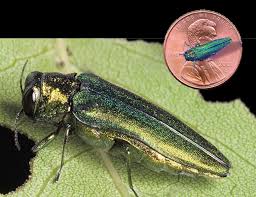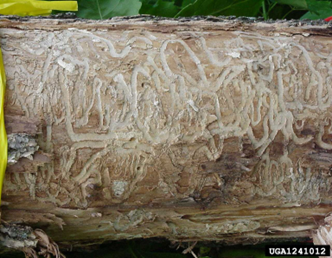Originally from Asia, the emerald ash borer (EAB) was first discovered in the Detroit area in 2002. It is believed to have entered the country on wooden packing materials. This beetle feeds on all species of ash trees Infested trees die within three to five years. As a non-native insect, EAB lacks natural predators to keep it in check. EAB was initially detected in VT in 2018 and has spread and established itself in most of Vermont.
Infested trees die within three to five years. As a non-native insect, EAB lacks natural predators to keep it in check. EAB was initially detected in VT in 2018 and has spread and established itself in most of Vermont.
Common Questions
Is there an established population in Vermont?
Yes. Emerald Ash Borer has been detected in almost all counties in Vermont.
Is emerald ash borer under a federal quarantine?
No. Emerald ash borer was officially de-regulated by the federal government in 2021.
What agricultural problems does emerald ash cause?
Emerald ash borer is a forest pest. The larvae are devastatingly effective at killing ash species and pose a serious threat to all north American ash trees.
What is the Agency is doing?
VAAFM continues to support and collaborate with the Department of Forests, Parks and Recreation to increase awareness about EAB and to help identify the leading edge of current infested counties.
Best management practices
Recommendations to Slow the Spread, and Resources for Forest Landowners and Managers, Homeowners, Municipalities, Volunteers, Educators, and others can be found here.
Additional Resources
- Emerald Ash Borer in Vermont | Vermont Invasives (vtinvasives.org)
- To report emerald ash borer, Reporting Emerald Ash Borer | Vermont Invasives (vtinvasives.org)
- Map: EAB detection in VT Emerald Ash Brer (EAB) Infested Area in Vermont (arcgis.com)

